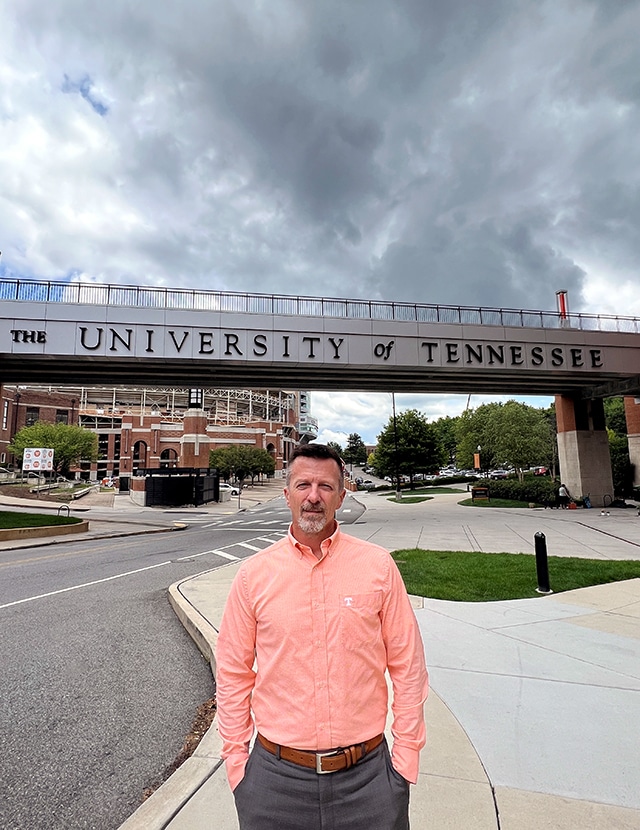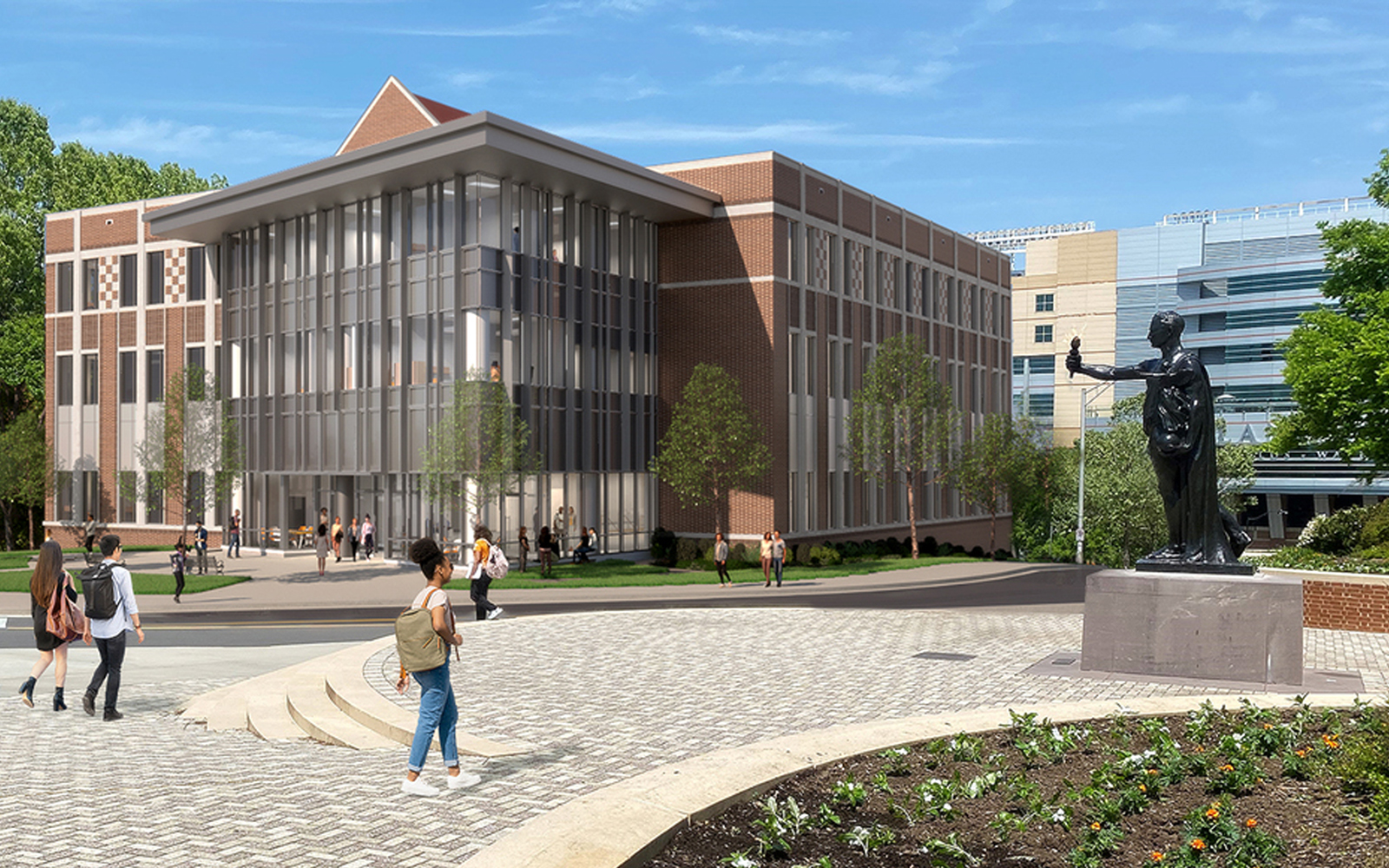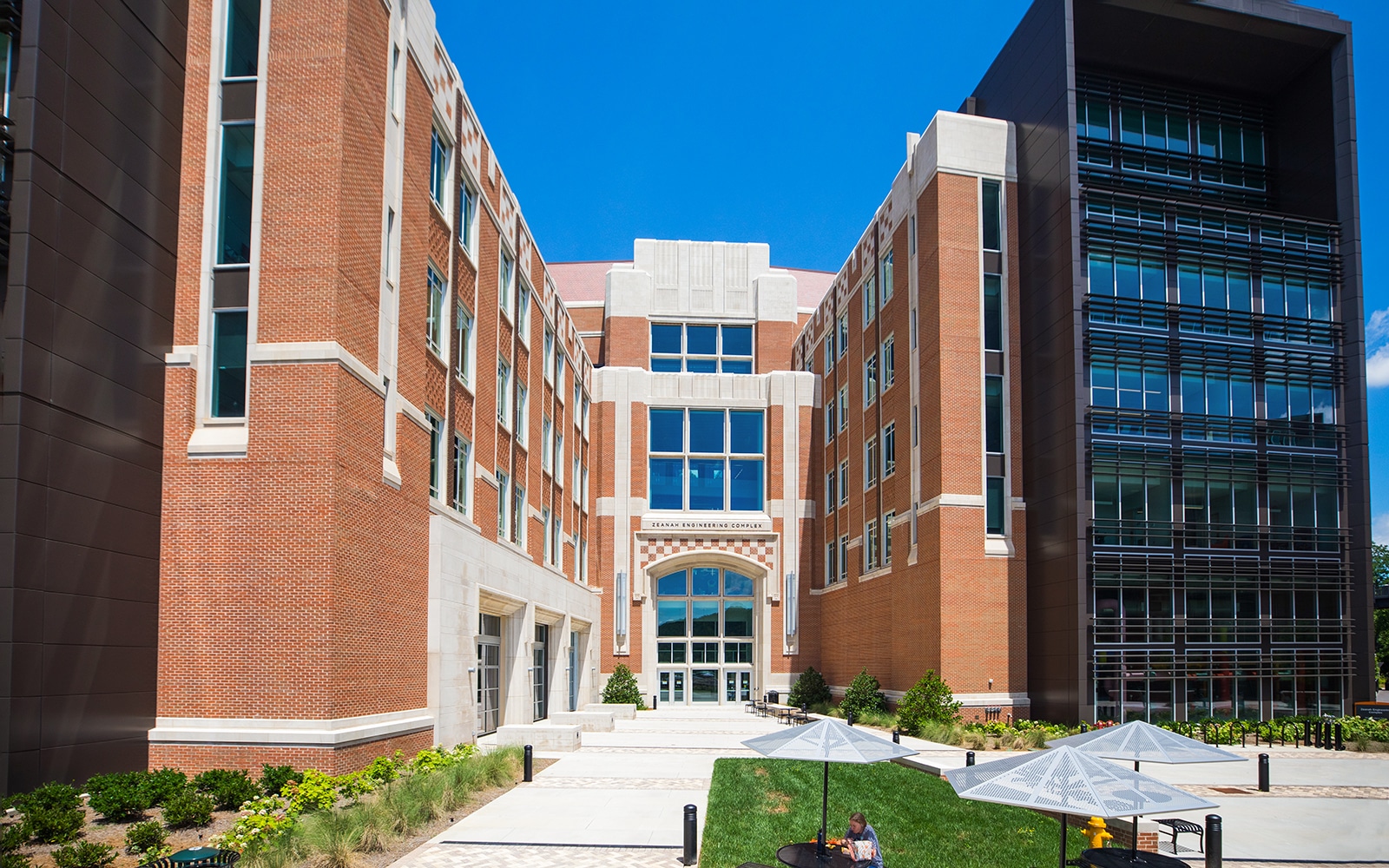|
Getting your Trinity Audio player ready...
|
Mike Brady understands a mission of support. For the students and faculty of the University of Tennessee, Knoxville (UTK), a well-functioning campus is an expectation, and they’re probably unaware that their associate vice chancellor of facilities services spent 20 years as a member of the Navy’s Civil Engineer Corps (CEC), including multiple tours with the historic Seabees, supporting military operations with life-or-death risks. But Brady says the path from the CEC to university facilities is more common than most would expect.
“There are probably between 50 and 60 universities whose facilities are run by retired CEC officers,” Brady explains. “You come into the job with connections to people you’d be willing to trust your life to. Even if you’ve never met before, you can trust their judgment based on your shared experience.”
Brady’s move into the CEC came early in the Navy after a sports accident ruled out a career as a pilot. For some, that transition from operator to mission support can be a difficult one.

“Suddenly, you’re not the person that they’re making the commercials about,” he says. “You have to reorient yourself and realize the people supporting the mission are just as important. Higher education requires the same support function. You’re part of something bigger than yourself, and you’re supporting the education and careers of thousands of people.”
But in candid conversation, Brady doesn’t possess a single iota of what some may see as stereotypical military behavior. He’s assured but not boastful. He’s direct, but kind. The reality is that throughout his military career, he was constantly working with the civilian sector and private companies. Barking orders wouldn’t get him anywhere. That was a lesson he had learned long before joining up, as the veteran’s father, both of his brothers, one of his sisters, and his father-in-law all served in various branches of the military.

Courtesy of Mike Brady
Campus Construction
While lives may not be on the line, there is still an incredible amount for Brady to prioritize and attend to at UTK, including Tennessee’s first-ever public-private partnership (P3). In May 2023, the university announced its intent to move forward with three multiuse student housing facilities in partnership with RISE Real Estate.
The project is estimated at over $400 million and is supporting the university’s campaign to add 2,500 beds over the next 3 years and another 2,500 within 5. The massive builds come with the additional pressure of the P3 being the first of its kind in the state. Brady is the first to tell you that he’s just one part of the process and that the project requires massive collaboration, not just across the university, but with all the partners involved.
Maintaining positive working relationships with vendors and contractors is an art unto itself, and Brady says maintaining those relationships is imperative not just for the short-term, but for facilitating future growth.

Ayers Saint Gross
“It is partnerships with companies like Trane Energy Services and BELFOR that are key to our success,” he explains. “Our employees work side by side with the contractors to quickly restore chillers in critical research facilities and in response to events like [2022’s] Winter Storm Elliott,” where record low temperatures and rolling blackouts on Christmas Eve resulted in extensive flood damage in dozens of buildings. But when students returned from break in January 2023, not a single class had to be rescheduled and no student was displaced from university housing—a testament to the teamwork.
The recently completed master plan lays out over $2 billion dollars in construction over the next 10 years. Ongoing projects include the recent phase one enhancements of Neyland Stadium, one of the largest and loudest stadiums in the country; the new 157,000-square-foot Energy and Environmental Science Research Building; and the 117,000-square-foot Croley Nursing Building.
Then, there’s planning for the new 240,000-square-foot Haslam College of Business; the 163,000-square-foot Chemistry Building; and the 130,000-square-foot Humanities Building, to name a few more.
Creating a Path Forward
“There is always more to do than you could possibly tackle in a day,” Brady explains. “You have to get good at identifying what is actually getting done today. The Naval Academy and a career in the military [were] great for honing prioritization skills, critical to staying focused and keeping things moving forward.”
Brady remains focused on filling facility vacancies that were a legitimate issue when he came to the university. As the cost of living continues to rise, facilities roles, which are traditionally the lowest-paid positions on campus, can be more difficult to fill.

Steven Bridges
“Chancellor [Donde] Plowman, whose mantra is that ‘it’s a great time to be a volunteer,’ has been incredibly supportive of our initiatives to fill vacancies,” Brady says. “It’s my goal to provide avenues for advancement and the opportunity to make a career out of facilities work at the university. I want to attract talent and give them a reason to remain a volunteer.” Additionally, apprentice programs provide potential talent the training they need to be successful and open those avenues.
It’s easy to understand what Brady has been able to bring to UTK. As the university continues building infrastructure to support its growing student body, those efforts are led by one of the very best (though he’s the last one to tell you so). Brady doesn’t mind working behind the scenes. It’s where he does his best work.
Trane® – by Trane Technologies, a global climate innovator, is proud to support the University of Tennessee, Knoxville. For over 50 years, we have been helping UT Knoxville light the way for others by creating indoor learning environments that are comfortable, sustainable, and energy efficient. We accomplish this by developing a deep understanding of the campus’ needs and goals and implementing thoughtful, rightsize solutions using a broad array of industry-leading building equipment and controls, digital technologies, and services. Like UT Knoxville, we believe in the power of innovation to change the world, and that what we do today matters more than ever.
The Christman Company, founded in 1894, is one of the country’s leading professional construction services firms. The company’s award-winning services include construction management, general contracting, design/build, program management, real estate development, self-perform, and millwork services. Christman specializes in a variety of construction markets, including government, higher and K12 education, industrial and power, healthcare, and corporate office.
Christman has proudly supported the growth of the University of Tennessee, Knoxville since 1946. Major recent projects include Neyland Stadium expansions and renovations, Student Union, Energy and Environmental Science Research Building, Ken and Blaire Mossman Science Building, and Strong Hall Science Laboratory.


